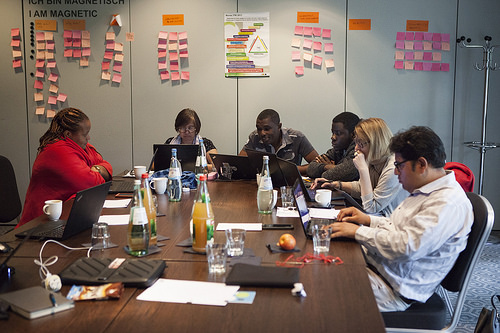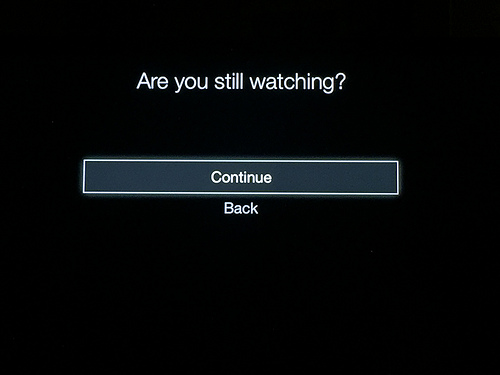Warning: I have NEVER seen Star Wars a day in my life. All I know about Star Wars is the line “May the Force Be With You”. Star Wars has nothing to do with this post, other than this week’s debate is “Technology is a force for equity in society” and the word force is in it. It’s probably not as clever as I thought it was. This week our debaters were Ryan who was on the agree with side and Kaytlyn who was on the disagree side.

So what is equity?
At first, I was confused about what exactly this topic was about. I had a general idea throughout the entire debate but it was not until someone in our class (I think Sydney) shared a good depiction of what equity it. I could try to explain the diagram but I do not believe I would do it justice so here is the link to the diagram. h
Agree
Our class was somewhat quiet during this debate but we were still able to draw come arguments on why technology is a force for equity in society (which branched off of ideas in Ryan’s video) including:
- Allows youth to have a voice
- Youth are able to voice their opinions online
- Refugee camps
- Technology is used to educate students in refugee camps
- Students with disabilities
- Technology is able to improve the quality of life for people with disabilities.
- For instance, for those who are unable to speak, they can use technology to say what they want to say.
- Example: Stephan Hawking
- For instance, for those who are unable to speak, they can use technology to say what they want to say.
- Technology is able to improve the quality of life for people with disabilities.

Ryan also was able to provide insight into this topic in his video including ideas such as:
- Technology is evolving, advancing, improving, and creating greater accessibility
- As technology advances, new tools are created to aid people with various disabilities which increases employment opportunities which leads to improvement of quality of life.
- Ex: speech generating technology
- Technology allows youth to form their own opinions instead of forming opinions off of what a parent/teacher/other major influencer in their life may hold
- Students can keep up to date with current events which they may not have been able to without technology
Dell Technologies also sheds light into the topic. The company offers programs to areas of the world which are not able to afford education and/or technology for their youth. By using technology, the company hopes to create new opportunities for youth. The goal is to “give a child living in a remote village access to the same information as someone living in the most affluent surroundings,”. So far, 2.6 million kids have been given this opportunity though Dell by using technology.
“Technology can empower children in developing countries – if it’s done right” branches off of the article above. One key point from this article I thought related very well to this debate is an idea from an Epic Group. A representative from the group, Duncan Clark was mentioned in the article saying “he believes that mobile technology has produced a ‘renaissance of reading and writing’ among young people across the world,”. If technology is assisting children in developing regions learn to read and write, it would create equity as they would be learning skills similar to children in developed regions.
Disagree
Kaytlyn argued this side of the argument but before we dive into her video and readings, let’s dive into our class discussion first. Thoughts and ideas formed in the discussion include:
- Accessibility to technology
- Some may not have access to technology and if they do, they may not have the means to use it such as no data or wifi
- Who is getting a voice?
- Those who have access to technology have the voice
- Raises the question, who is being marginalized?
- Those who have access to technology have the voice
- Is technology equality more important than you know, social rights equality?
- Techno-colonialism is imposing what is success
- Financial abilities
- Some can afford technology while some cannot

Kaytlyn’s video also covered more points relating to her side of the debate. Points included are:
- Digital Divide
- Those who have access to technology to those who do not
- Rural and low-income students are affected by this
- Ex: no access to public libraries, no strong internet connection
- Rural and low-income students are affected by this
- Those who have access to technology to those who do not
- Civil Rights Issue of the 21stCentury
- Students in wealthier areas have access to educational opportunities while students away from this area are not
- Ex: look at who are offered AP classes
- For instance, I attended a school where no AP classes were offered, but just a little further up the highway, about a 20-minute drive, the neighbouring high school had several AP classes. They were a city school and we were more rural, see the difference?
- Ex: look at who are offered AP classes
- Students in wealthier areas have access to educational opportunities while students away from this area are not
“Schools Tap Secret Spectrum To Beam Free Internet to Students” discusses a school which has set up an internet tower where the school enables all students to have access to the internet at home. This is like the fence diagram I mentioned above, what happens? In this situation, the fence is simply removed. But with everything good, there has to be something bad. The price. A set up like this is quite pricey thus limiting who is able to offer their students such great support.

Ted Talk Time. Mark Barnett’sTed Talk “Everyone is a Maker, but not everyone has access” opens up by discussing students who are reading textbooks which are 10 years old even though they have the most current information right in their pockets, in their cellphones. He then goes on to explain a Maker Space camp he held, moving into the Maker Movement. While Barnett held very valid points why such spaces were good, he also mentioned “some schools do not understand the power of teaching through projects like this,”. This really caught my attention. While technology being a force of equity in a society may be seen as impossible because of financial situations and accessibility. Another factor weighing in to why it is not a force, may be because people have ideas of what should or should not be taught or used in the classroom. If schools avoid areas like maker spaces, they are only giving students a limited range of learning opportunities.
The Verdict
I am still not overly sure what this topic was to mean. Maybe it’s due to the lack of education I have in the field of education or maybe it’s just a difficult topic. Ultimately the side I chose to end this debate is to disagree that technology is a force of equity in society.
Thanks for reading,
- Miss. Lang











